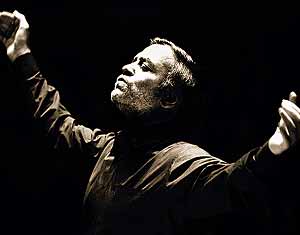21.09.2008
September 18, 2008 (the date of publication in Russian)
Alexander Rublev
EFFORTS OF LIE VS POWER OF ART
The malicious attack on Valery Gergiev questions The Times' intellectual credibility
 A month ago, RPMonitor wrote about the impressive concert, delivered in the central square of the ruined Tskhinval, capital of South Ossetia, by world-famous musical conductor Valery Gergiev, a great son of the Ossetian nation.
A month ago, RPMonitor wrote about the impressive concert, delivered in the central square of the ruined Tskhinval, capital of South Ossetia, by world-famous musical conductor Valery Gergiev, a great son of the Ossetian nation.
A strikingly dilettantish and recklessly arrogant coverage of the same concert by major British media, venturing to teach Mr. Gergiev "lessons of life", is forcing us to return to the subject.
In its editorial comment entitled Music and Politics, the editors of The Times crack down on the musician, rhetorically inquiring whether he should be condemned (sic) for choosing an improper cause to "celebrate" – though even the eyewitness report of the same paper’s correspondent Tony Halpin does not describe the event in Tskhinval as celebration.
Admitting the fact that Valery Gergiev is the "the principal guest conductor of the London Symphony Orchestra", the editors claim that by playing in South Ossetia, the musician is "demeaning his talents" by "putting them at the service of a propaganda celebration of Russian military might". Moreover, the paper's editors conclude that the conductor "has crossed the line that ought to separate art from politics, beauty from brutality. He has made his music an instrument of Russian foreign policy, conducting in the name of conquest". Summarizing these conclusions, the irritated editors accuse the musician of "applying his talents in the name of what this newspaper deems an unwarranted act of war, an imperialist urge resulting in a military intervention".
Despite "associating his musical brilliance with Moscow's military bullying", The Times kindly allows Gergiev to continue his concerts in Great Britain, indicating that "in the Western society, it is important to realize that in a Western society this conductor can still play freely, despite his controversial visit. Defiance in Mr. Putin's Russia, as in the Soviet Union, results in ostracism. It should not do so here". Obviously trying to convince the paper's audience that Gergiev delivered his concert under pressure from the Russian Defense Ministry, the authors donТt bother giving at least one example of ostracism of a contemporary artist by Russian authorities for political dissent.
The editors of The Times seem to be astronomically distant from the world of arts. Otherwise, they would admit that it is not Mr. Gergiev who is obliged to the official London, but rather the British audience is obliged to the great musician who donates them his art.
So, where is the line, separating "brutality from beauty"? The Times proposes examples of "combination" of arts and politics which does not "demean talents". For instance, the participation of Mstislav Rostropovich and Leonard Bernstein in the concert, dedicated to the fall of the Berlin wall, is regarded as acceptable, as well as the Live Aid musical festivity in favor of the starving population of Ethiopia. For some reason, the example of Dmitry Shostakovich, who "voiced the courage and defiance of his fellow Russians starving in the besieged city of Leningrad", is envisaged in the same row. At this moment, the erudition of the editors comes to an end, as they don't know what musical piece Shostakovich performed at his famous Leningrad concert.
The British colleagues should clarify this issue, and then compare the information with Gergiev's repertoire in Tskhinval. In this case, they would realize what Gergiev wanted to express in his artistic language. In case they also bother to learn to understand the language of music, they would probably discover that Shostakovich's 7th Symphony, performed in Tskhinval, is not a war march appropriate to the triumphant style of Rudyard Kipling's novels, written in the name of the conquest of India. It is a qualitatively different musical message, destined not for glorification but for commemoration of the martyrs and for conveying spiritual strength to the survivors of a besieged but stubbornly resisting city Ц Leningrad from September 1941 till January 1944, or Tskhinval from the Christmas of 1991 till August 2008.
Does the editorial board of The Times include sufficiently educated individuals capable to independently ascend to these simple parallels? Or maybe, the disregard of historical facts served only as a cover for banal lie, intended to vilipend the significance of Gergiev's concert and to distort its message?
It is noteworthy that The Times is not a tabloid but a highly respected paper, believed to represent centuries-long traditions of British culture. The bullying attack on Mr. Gergiev has severely damaged this paper's reputation Ц not only in Russia. In the effort to misinterpret the musical message of the Ossetian genius, The Times has disparaged not his talent but its own credibility.
This is most convincingly proven by the response of the readers Ц not only from Russia but also from Finland and Wales who remind the editors that they Ц as well as the White House in Washington Ц has not got an authority for judging on whether "the cause is just", and correctly indicate that "one can't have one rule for America and a different rule for everyone else". It is noteworthy that this view is shared also by persons like Sir Christopher Meyer, Britain's Ambassador in Washington in 1997-2003 who not only argues that Russia "will never be reassured by the West's protestations of pacific intent as it pushes NATO and the EU ever eastwards" but also urges NATO to "renounce the provocative folly of being open to Georgian or, worse, Ukrainian membership".
Number of shows: 1980
 ENG
ENG 

 ENG
ENG 
